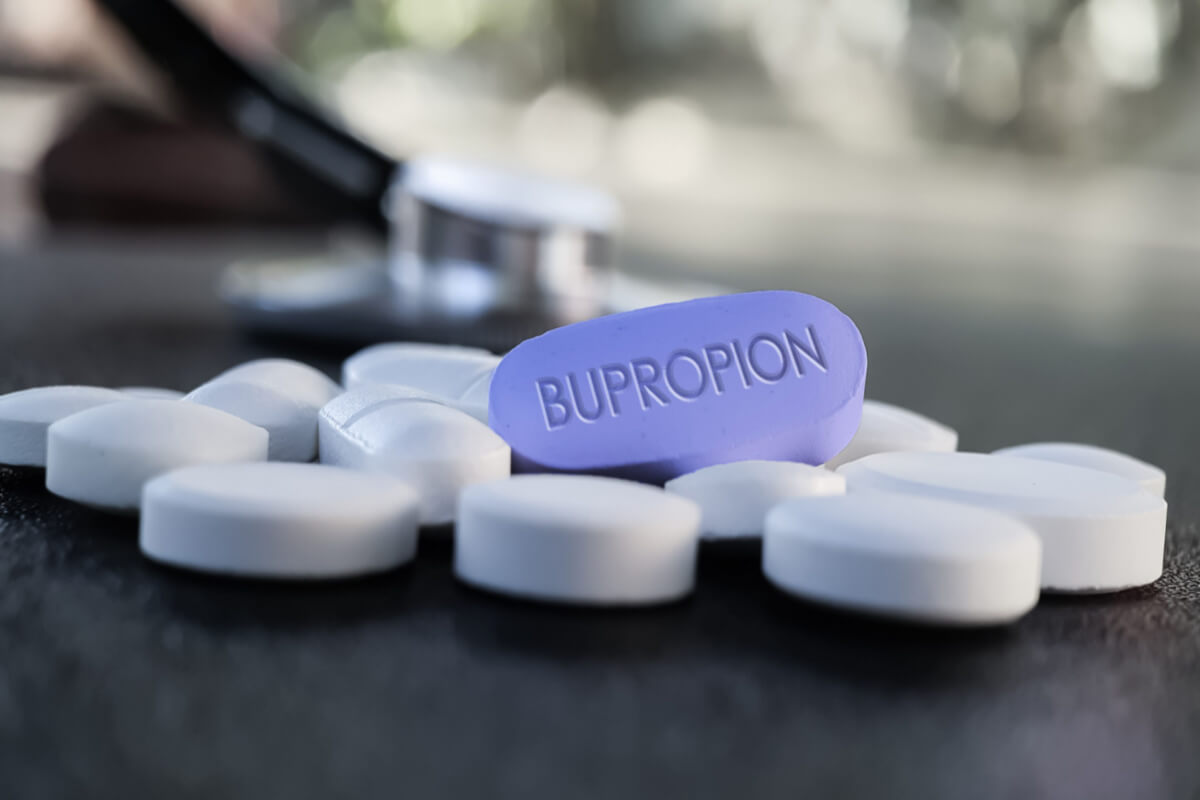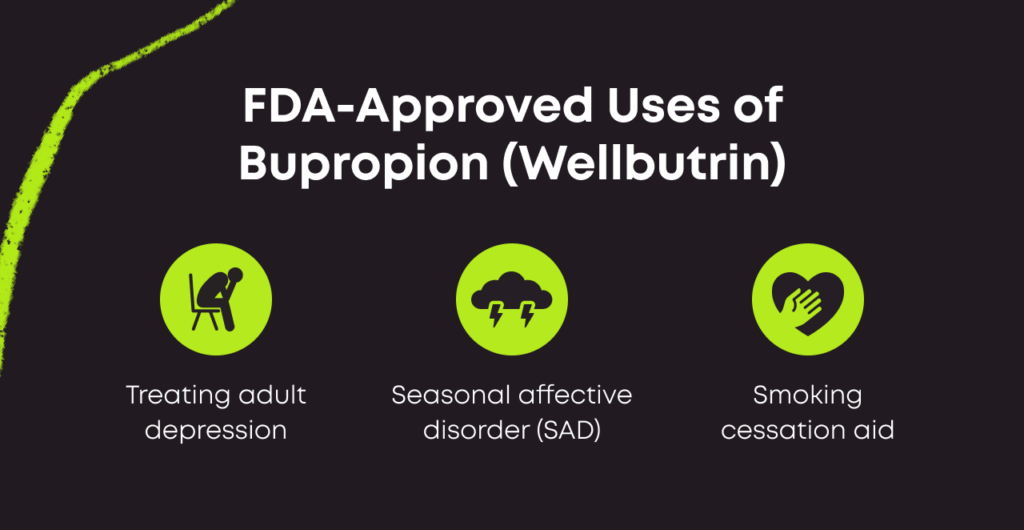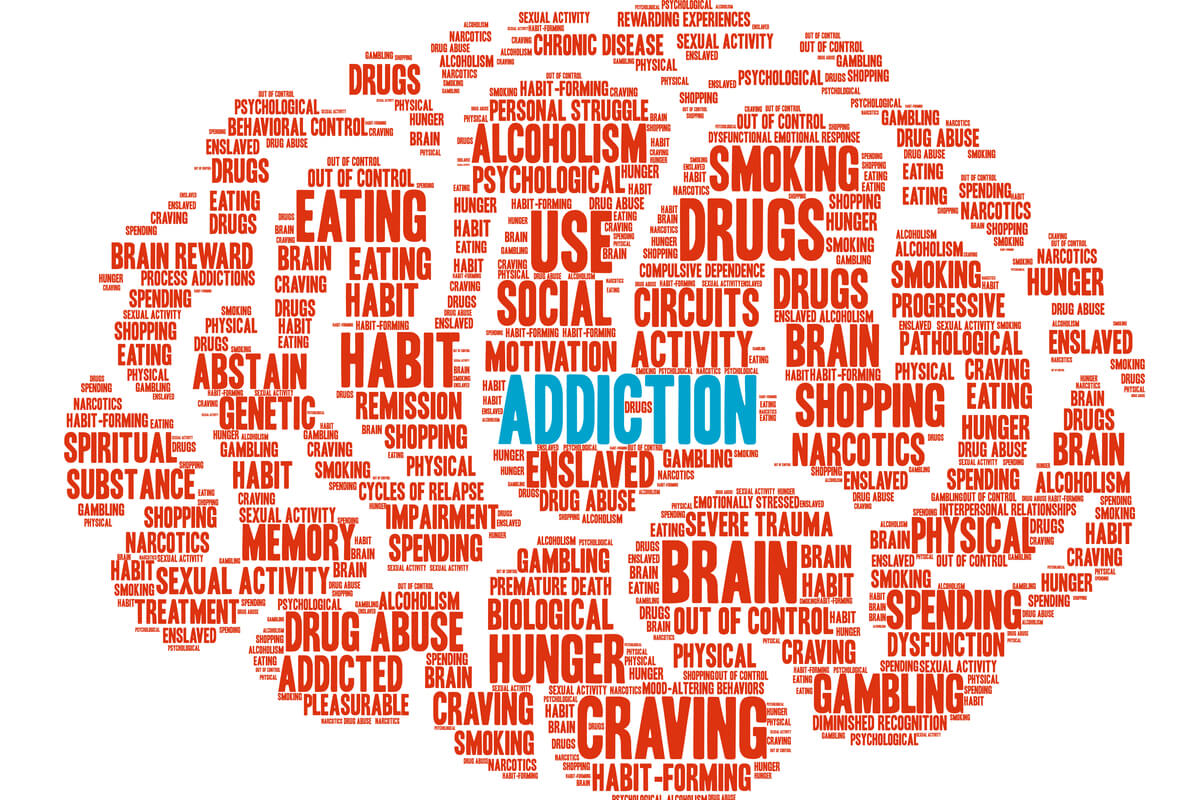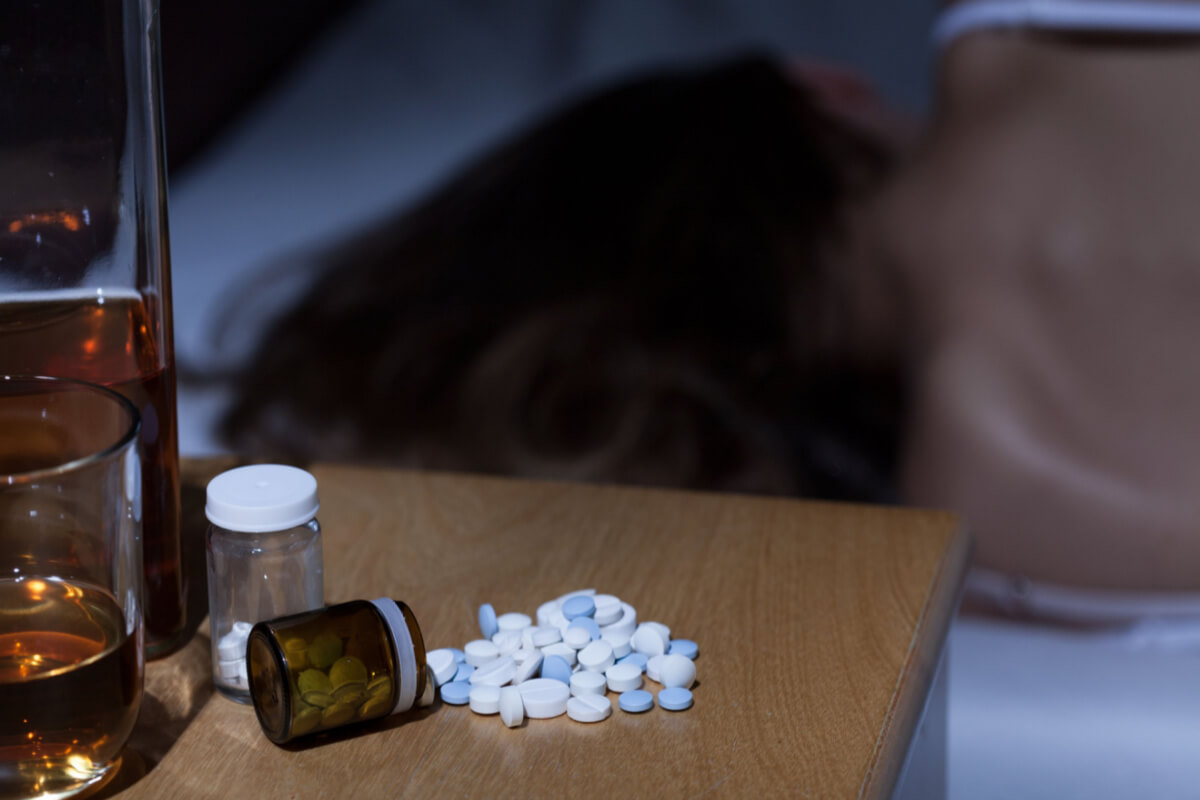
Bupropion is an antidepressant medication approved by the Food and Drug Administration (FDA) for use in helping with smoking cessation. However, it also has some promise in curbing cravings and withdrawal symptoms for methamphetamine and cocaine. That said, more research is needed.[6],[7],[8]
History of Bupropion (Wellbutrin)
Bupropion was patented in 1974 by Burroughs Wellcome, which is now part of GlaxoSmithKline. It was approved for medical use by the FDA in 1985.[1] It was first approved as a medication for depression, but it was soon observed that it was also helping people to quit smoking.
There have been a few controversies associated with the medication despite it having legitimate uses. GlaxoSmithKline was fined $3 billion in 2012 for promoting the medication for weight loss and to treat sexual dysfunction, which were unapproved uses.[1]
These days, bupropion is used for two main indications: depression, smoking cessation, and sometimes both at once.

What is Wellbutrin Approved to Treat?
The FDA has approved bupropion for use in treating adult depression, seasonal affective disorder (SAD), and to help people quit smoking. [1]
Off-label it is sometimes prescribed to treat attention-deficit/hyperactivity disorder (ADHD), depression associated with bipolar disorder, antidepressant-induced sexual dysfunction and obesity.[1]
Wellbutrin Mechanism of Action
The mechanism by which it works isn’t fully understood, but it does affect the reuptake of two important neurotransmitters, norepinephrine and dopamine. It is thought to inhibit the reuptake of these two chemicals, thus increasing dopamine and norepinephrine levels in the brain.[1],[2]
Dopamine is commonly referred to as the pleasure neurotransmitter and is associated with feelings of reward and motivation. Meanwhile, norepinephrine is responsible for increased attention, alertness and arousal. The increased levels of dopamine and norepinephrine lead to Wellbutrin’s antidepressant effects.
Additionally, because stimulants like methamphetamine and cocaine increase synaptic levels of dopamine and norepinephrine in the brain, this may be why bupropion can curb stimulant withdrawal symptoms and cravings. [10]
When used for its approved purposes and prescribed by a medical professional, the drug is very safe, although it does, like all medications, have some side effects to look out for. [2]
Do Doctors Use Wellbutrin in Off-Label Ways?
Yes, doctors sometimes use bupropion to treat the following conditions:[1]
- Antidepressant-induced sexual dysfunction
- ADHD
- Depression associated with bipolar disorder
- Obesity (usually adjunctively in combination with other medications for weight loss)
And in some situations, doctors or addiction treatment specialists may prescribe bupropion for people with a stimulant use disorder on its own or co-occurring stimulant use disorder and bipolar disorder. However, this largely depends on the rehab program and treatment team.[7],[8]
What Are the Side Effects of Wellbutrin?
Some side effects associated with bupropion (including Wellbutrin) include the following:[1]
- Anxiety
- Headaches
- Difficulties initiating or maintaining sleep
- Dizziness
- Dryness of the mouth
- Excessive perspiration
- Rapid heart rate
- Insomnia
- Weight loss
- Sweating
- Nausea
- Constipation
- Tremors
- Blurred vision
More serious side effects can also sometimes occur. These signal a serious medical issue that warrants calling your doctor as soon as possible or, in some cases, calling 911.
The most dangerous side effect of bupropion is its ability to induce seizures in patients with known seizure disorders. This is because Wellbutrin lowers the seizure threshold. [1] If you are considering Wellbutrin but have a history of seizures, you should ask your doctor before taking this medication.
Additionally, Wellbutrin can exacerbate suicidal ideation. [1] It’s important to talk to your provider and therapist if you are experiencing suicidality. And seek emergency inpatient care if needed.
How Is Wellbutrin Used in Recovery From Opioid Use Disorder?
While bupropion itself is not a treatment for opioid use disorder, untreated depression can often exacerbate or fuel an addiction. And opioid use disorder and depression commonly co-occur. About 43% of people in treatment for prescription painkiller addiction have a comorbid mental health condition like depression or anxiety.[9]
Buproprion may therefore be used in combination with other antidepressants or addiction treatment medications to help treat both mood as well as opioid use disorder.
Moreover, people with opioid use disorder commonly misuse stimulants as well. Polysubstance misuse is associated with worse treatment outcomes and more medical emergencies than people who misuse one substance. One study found that prescribing Wellbutrin and an OUD medication like Suboxone or naltrexone was associated with fewer stimulant-related hospital admissions among people with OUD. The authors concluded that bupropion may be a promising medication for those who misuse stimulants.[3]
Is Wellbutrin Addictive?
Bupropion isn’t addictive, and patients with a history of Substance misuse should not be worried about being dependent on this medication. Patients who take bupropion do not develop cravings to use it more frequently, and it is therefore not considered addictive at all.
However, while bupropion isn’t “addictive”, it does build up in the body and can cause some withdrawal symptoms if it is stopped abruptly, such as recurrent depression or anxiety, tremulousness, headaches, etc. While this is not dangerous or life threatening, it can be very unpleasant and uncomfortable. Therefore, if you have been taking bupropion for a long time, you should discontinue it slowly, ideally with the assistance of a medical professional.
Can You Overdose on Bupropion?
It is possible to overdose on bupropion, but accidental overdoses are rare.[4] More common is intentional overdosing, as the drug is used to treat depression but can also increase suicidal ideation in some people.
FAQs About Bupropion (Wellbutrin) in Addiction Recovery
Some frequently asked questions about this medication include the following:
Bupropion is not the same as Xanax. Xanax is a brand name for alprazolam, a prescription benzodiazepine. Bupropion, often sold under the brand name Wellbutrin, is a type of antidepressant, a norepinephrine-dopamine reuptake inhibitor. They are not the same class of medication.
Bupropion is approved for use in smoking cessation and can help a person control their cravings to smoke. It can be used in combination with behavioral therapy or other medications such as nicotine replacement therapy or Chantix (venlafaxine) to help patients to quit smoking.
Yes, many people take Wellbutrin regularly and also drink alcohol. As with any medication, it is best to drink in moderation, and to drink carefully at least at first after starting Wellbutrin. But taking wellbutrin is not a contraindication to drinking alcohol or vice versa.
Generally, you shouldn’t stop taking any prescription medication without first talking with your doctor. Stopping bupropion abruptly is not life-threatening, but it can cause some unpleasant withdrawal symptoms. It is recommended a patient slowly taper off antidepressants slowly to prevent this. [5]
No, bupropion is not a stimulant. It is classified as an antidepressant, specifically a norepinephrine-dopamine reuptake inhibitor.[1]

Reviewed By Peter Manza, PhD
Peter Manza, PhD received his BA in Psychology and Biology from the University of Rochester and his PhD in Integrative Neuroscience at Stony Brook University. He is currently working as a research scientist in Washington, DC. His research focuses on the role ... Read More
- Huecker MR. Bupropion. National Library of Medicine. Published January 2023. Accessed August 14, 2023. https://www.ncbi.nlm.nih.gov/books/NBK470212/
- Bupropion. National Library of Medicine. Published February 15, 2018. Accessed August 14, 2023. https://medlineplus.gov/druginfo/meds/a695033.html
- Xu KY, Mintz CM, Presnall N, Bierut LJ, Grucza RA. Association of bupropion, naltrexone, and opioid agonist treatment with stimulant-related admissions among people with opioid use disorder: A case-crossover analysis. Journal of Clinical Psychiatry. 2022 Jun 20;83(4):21. https://pubmed.ncbi.nlm.nih.gov/35759785/
- Stall N, Godwin J, Juurlink D. Bupropion abuse and overdose. CMAJ. 2014;186(13):1015. doi:10.1503/cmaj.131534
- Berigan TR, Harazin JS. Bupropion-associated withdrawal symptoms: A case report. The Primary Care Companion to the Journal of Clinical Psychiatry. 1999: 1(2): 50-51. https://www.ncbi.nlm.nih.gov/pmc/articles/PMC181057/
- Treatment of Methamphetamine Cravings with Bupropion: A Case Report. Primary care companion to the Journal of clinical psychiatry. https://www.ncbi.nlm.nih.gov/pmc/articles/PMC181198/. 2001. Accessed January 2024.
- Bupropion: Off-label treatment for cocaine and methamphetamine addiction. Current Psychiatry. https://www.mdedge.com/psychiatry/article/63972/addiction-medicine/bupropion-label-treatment-cocaine-and-methamphetamine. 2011. Accessed January 2024.
- Bupropion Treatment for Stimulant Withdrawal in a Patient with Substance Use Disorder and Unspecified Bipolar Disorder. Cureus. https://www.cureus.com/articles/149411-bupropion-treatment-for-stimulant-withdrawal-in-a-patient-with-substance-use-disorder-and-unspecified-bipolar-disorder#!/. 2023. Accessed January 2024.
- Common Comorbidities with Substance Use Disorders Research Report. National Institutes on Drug Abuse. https://www.ncbi.nlm.nih.gov/books/NBK571451/#. 2020. Accessed January 2024.
- Norepinerphine and Stimulant Addiction. Addiction biology. https://www.ncbi.nlm.nih.gov/pmc/articles/PMC2657197/. 2009. Accessed January 2024.
Download Our Free Program Guide
Learn about our program, its effectiveness and what to expect
Related articles
Imagine what’s possible on the other side of opioid use disorder.
Our science-backed approach boasts 95% of patients reporting no withdrawal symptoms at 7 days. We can help you achieve easier days and a happier future.








